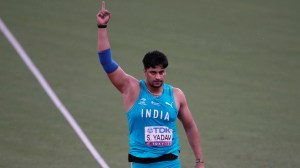Nanda and the politics of integrity
With the passing of Gulzarilal Nanda India loses yet another of its dwindling links with two defining processes of its contemporary history ...

With the passing of Gulzarilal Nanda India loses yet another of its dwindling links with two defining processes of its contemporary history — the freedom struggle and post-Independence development. The first, dominated by Mahatma Gandhi, led to Independence which in turn was instrumental in triggering global decolonisation. The second, presided over by Jawaharlal Nehru after Sardar Patel’s death, overcame the trauma and dislocation of Partition and nationwide communal carnage and placed India’s independence on sure foundations. Nanda, of course, did not play a determining role in either. He was, rather, among those whose support from close proximity enabled executors of seminal changes to succeed. In this, he belonged to a distinguished group comprising stalwarts like C. Rajagopalachari, Nabakrushna Chowdhury, Gopinath Bordoloi, B.P. Chaliha, Dr. B.C. Roy, Dr Srikrishna Sinha, Govind Ballabh Pant, Dr Sampurnanand, Rafi Ahmed Kidwai, Acharya J.B. Kripalani, B.C. Kher and Jayaprakash Narayan, who stood only a step behind stalwarts like Mahatma Gandhi, Jawaharlal Nehru, Subhas Chandra Bose, Maulana Abul Kalam Azad and Rajendra Prasad.
All of them were men of education, wisdom and character who joined politics when it was synonymous with the freedom struggle and the sacrifices required of participants in it. They remained in positions of leadership after Independence and did much to account for the stability and growth the country enjoyed in the Fifties and the early Sixties. Nanda, who plunged into the national struggle at Gandhiji’s instance, held important positions in government after Independence. He remained widely respected for his integrity till the very end — in sharp contrast to the current practitioners of politics. He also had in abundant measure the competence that characterised them. Significantly, he was both Deputy Chairman of the Planning Commission and Planning Minister. Since the foundation of the state-led pattern of post-Independence development, which Nehru opted for, was planning, it showedthe confidence India’s first Prime Minister had in him. It was not misplaced.
India has travelled a long way down the path of political decline since the time men like Gulzarilal Nanda held office. There have been many reasons for this. Men like him are no longer coming into politics. The burning urge to end the humiliation of foreign rule had brought thousands of talented persons into the freedom struggle. Independence has removed that urge and opened up lucrative avenues. Not many who have an option now want to enter the treacherous water of politics and the economic uncertainty the latter involves. Nor have the political parties been keen to promote capable people of integrity. With the State as the cutting edge of development and the fountainhead of patronage, politics has become a form of business enterprise.
The award of Bharat Ratna to him was more a salute to a vanished past rather than a reaffirmation of values and practices in existence. Of course, in politics as in life, there is always a tendency to look back to a golden era when good prevailed over evil, virtue over vice, and life moved in smooth purposeful strides. In most cases, this is primarily the result of the phenomenon of distance lending enchantment, being at work. In some cases, however, the wistful glances at the past have a measure of justification. It is so in India when people look back to the first decade and a half after Independence. It doubtless has its critics. In the economic sphere, planning, one of its principal features, did not bring in an economic millennium. Yet only the utterly myopic will fail to see its decisive contribution to building the infrastructural foundations of India’s economic and the latter’s core sector of heavy industry, which have given to India the kind of economic strength and resilience which the South-East Asian tigers lack. Similarly, non-alignment had its rough passages. Yet, its basic soundness stands vindicated by events.
These policies are changing. Liberalisation is marginalising planning, however fervent the lip service paid to it. Non-alignment has undergone drastic modification in a unipolar world. But did we also have to jettison the integrity and civility in public life which Gulzarilal Nanda represented?
Photos



- 01
- 02
- 03
- 04
- 05




























